
|
Quo
Vadis (1951)
In director Mervyn LeRoy's and MGM's big budget epic
version of Henryk Sienkiewicz's classic 1896 novel about Roman Emperor
Nero's Christian persecution - the lengthy movie
was MGM's most expensive film of the time period (at $7.6 million);
it starred Deborah Kerr and Robert Taylor, and featured
a score by Miklós Rózsa; there were
three other versions of the novel, including two silent historical
dramas: Quo
Vadis? (1913, It.) and Quo Vadis? (1924, It./Germ.), and Quo
Vadis (2001, Poland):
- the film (with a title translated 'Where are you
going?') compressed the historical years of 64–68
CE (combined with other fictional events and characters) to survey
the Roman Empire's goal to destroy and persecute followers of the
conflicting religion of Christianity
- the opening voice-over narration (by Walter Pidgeon)
described the dominance of Rome: "This is the Appian Way, the most
famous road that leads to Rome, as all roads lead to Rome. On this
road march her conquering legions. Imperial Rome is the center
of the empire and undisputed master of the world. But with this
power inevitably comes corruption. No man is sure of his life.
The individual is at the mercy of the state. Murder replaces justice.
Rulers of conquered nations surrender their helpless subjects to
bondage. High and low alike become Roman slaves, Roman hostages.
There is no escape from the whip and the sword. That any force
on Earth can shake the foundations of this pyramid of power and
corruption of human misery and slavery, seems inconceivable"; the
narration ended with the brief mention of Jesus' crucifixion and
miraculous resurrection 30 years earlier
- the plot began in the summer of 64 AD outside Rome
on the Appian Way, "in the reign of the Antichrist known to history
as the Emperor Nero"; General Marcus Vinicius (Robert Taylor) commanded
the victorious 14th legion on its way back to Rome after three
years of "brilliant victories" on the battlefield (fighting in
Britain and Gaul); when told to camp outside Rome, Marcus personally
confronted the tyrannical Divine Emperor Nero (Peter Ustinov) to
complain, and with the aid of his uncle Gaius Petronius (Leo Genn),
one of Nero's most trusted advisors, he was told that the delay
was due to preparations for a triumphant and spectacular homecoming
celebration the next day
- Petronius informed Marcus that the notorious Nero
had committed atrocities - he had murdered his wife and mother
(Agrippina and Octavia) and married a "harlot" slave named Poppaea
(Patricia Laffan), prompting the Senate to consider replacing Nero
with General Galba of Tuscany
- that evening at the country place of retired Roman
General Plautius (Felix Aylmer) and his wife Pomponia (Nora Swinburne),
Marcus met Plautius' adopted daughter Lygia (Deborah Kerr) (although
he first mistook her for a house slave); she was a truly devout
young Christian woman who was technically a hostage or ward of
the state of Rome after being taken prisoner during a Roman campaign
against her father, the King of Lygia); he began to take a romantic
interest in her, although she rebuffed his crude advances (she
was disturbed by his brutalistic and bloody military background);
during his brief visit at the General's home, Marcus was introduced
to family friend Paul of Tarsus, a philosopher-rabbi/teacher who
spoke of peace, and spreading love and faith; Paul mentioned that
apostle Simon Peter, a fisherman who had spoken to Christ, was
on his way to Rome during his travels
|
Marcus' First Encounter with Lygia (Deborah Kerr)
|

|

|

|
- later that evening when they spoke privately, Lygia
admitted to Marcus that she was attracted to him, but was upset
by his "ugly stories of conquests and bloodshed"; she proposed
a different, Christian way of life: "Without bloodshed and war.
Without slaves and captives bound in chains to your triumphal chariots....Paul
speaks of a world where there would be no slaves"; when he proposed
buying her if she was a slave, she sharply reprimanded him: "What
a way for a conqueror to win a woman. To buy her like an unresisting
beast. What false security you must have in your heart and soul";
later that night, she prayed that Marcus would be converted to
her faith: ("I pray that one day, he shall feel the joy of your
love"); Christianity was signified by the simple symbol of a fish
(icthus)
- at the military celebration held for Marcus' troops
the next day that praised the dominance of Rome, the tortured, infamous
and slightly-mad Nero complained about the heat, and the demanding,
foul-smelling rabble-mob outside his palace, but reluctantly made
an appearance

Nero Waving to the Mob from the Balcony
|
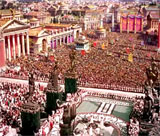
Military Celebrations in Rome Presided Over by Nero
|

Marcus Lauded in a Military Parade
|
- although Petronius's offer of a pretty female Spanish
slave named Eunice (Marina Berti) was refused, Marcus' uncle was
able to convince Nero to acquire Lygia for Marcus in gratitude
and as a reward for his devoted and brave military service; during
the festivities, Nero's consort Poppaea became jealous of Marcus'
interest in Lygia; while singing and playing
the lyre, Nero suggested burning the city of Rome in order to inspire
him to create better song lyrics: (Petronius objected: "To burn
a city in order to create an epic? That's carrying the principle
of art for art's sake too far")

Poppaea Jealous of Marcus' Interest in Lygia
|

Nero Singing with Lyre
|

Nero's Contemplation About Burning Rome
|
- Lygia was incensed for being treated as Marcus'
property: "And there were moments when I thought I could love you....What
difference does it make whether I love, now that you own me?";
the empress Poppaea noted Lygia's resistance to
Marcus: "You seem to have been having difficulty in proving your
ownership"; meanwhile, as Lygia was being escorted by guards to Marcus' residence, she was
aided in her escape by her giant bodyguard Ursus (heavy-weight
boxer Buddy Baer), a converted Christian
- after Marcus went to locate Lygia and couldn't
find her at General Plautius' home, Petronius told him that Lygia
was part of a secret sect devoted to the crucified Jesus: "You
picked the cherished egg in a nest of Christians. She's a Christian,
and Christians have spirited her away"; according to Petronius,
Christians were a threat to Rome and Roman law, and Jesus was considered
to be "a rebel against the state, a Jew called Christ, crucified
in Palestine... They are a constant worry to Nero and the Senate"
- Marcus decided to go undercover and with a soothsayer
named Chilo (John Ruddock) and a bodyguard named Croton (Arthur
Walge), he attended a secret ritualistic baptism ceremony held
in cave ruins after dark outside the city, where he spotted Lygia;
he listened as apostle Simon Peter addressed the audience about
the miracle of Jesus filling his fishing nets, exemplifying the
power of the Son of God who had come to establish the kingdom of
Heaven on Earth; Simon also confessed that he had denied knowing
Jesus three times before his crucifixion at Calvary, but was now
committed to dying for him
- following the night's ceremony, Marcus followed
Lygia and fought against her bodyguard Ursus - Chilo ran off as
Croton was killed and Marcus suffered a head wound; he was cared
for by Lygia, and after recovering, he asked for her hand in marriage
- and they passionately kissed; he promised: "I'm willing to accept
your God, if it makes you happier"
- however, he finally understood
her whole-hearted devotion to Jesus when he demanded
that she choose between her faith and him; jealously disgusted
by her answer that she would keep Christ in her heart, he denounced
her religion ("A cringing God for slaves, aliens, and outcasts
like yourself") and her very deep beliefs: ("You're going to be
wife of Commander Marcus Vinicius, not the miserable slave of
some crucified carpenter...I'd no more share you with your Christ
than I would with other men"); in frustration after she chose Christ,
Marcus renounced her, broke their relationship, and departed to
Antium where he was tempted to engage in an affair with the lustful
Poppaea ("I should like to vanquish you, Marcus") who knew about
his failed romance with Lygia
- meanwhile in his lavish coastal villa at Antium,
the despotic, petulant, matricidal and unhinged tyrant Nero ("The
world is mine. And mine to end") was contemplating the construction
of a "new Rome" known as 'Neropolis' (envisioned in a gigantic
architectural model to be built in his own image), to replace the
current city of Rome; he had sent a squadron of soldiers led by
General Tigellinus (Ralph Truman) to set fire to the city ("Rome
is a sea of flames. It burns from rim to rim"); Petronius noted
cynically: "Now, indeed, Nero has his place in history"

The Increasingly-Mad and Irrational Nero
|

Nero's Architectural Model Plans for a "new Rome"
|

Marcus' First View of the Inferno in the City of Rome
|
- although pursued, Marcus rushed back to Rome in
a stolen chariot to save Lygia; as Rome burned while Nero played
on his lyre, he heard mobs of vengeful Romans entering his palace
at Antium and calling him an "incendiary"; Poppaea suggested to
Nero that he not blame General Tigellinus for the devastating inferno,
but blame the Christian sect instead: ("A group who worship one
they say is higher than you. They are the enemies of the human
race, and of you"); Nero decided to proclaim that the Christians
would be punished in "a spectacle of terror"; Petronius objected
and protested, but his words did not sway Nero: "Condemn these
Christians and you make martyrs of them and insure their immortality.
Condemn them, and in the eyes of history, you'll condemn yourself"
- together with his uncle Petronius, Marcus signed
a letter to replace the "maniac" Nero with General Galba; meanwhile,
Nero was arresting and imprisoning Christians, including the family
of retired General Plautius and Lygia; Marcus was also seized and
ordered to be put "with his Christian friends" - possibly for his
part in the rebellion and for slighting Poppaea; in a prison cell,
Lygia informed Marcus that they were destined to be slaughtered
in the Circus by lions; some of the Christians began to doubt their
redeemer, although many retained their faith
- while leaving Rome and walking along with young
orphan Nazarius (Peter Miles) on his way toward Greece, Peter had
a vision of God as light shining through a tree - and realized that
he must return to Rome; he knew that he would probably be arrested
and crucified
- at a farewell dinner with his closest associates,
Petronius liberated his lover Eunice from slavery, and then called
for an attending physician to supervise his death by slitting his
wrist: ("It is not enough to live well. One must die well"); distraught,
Eunice decided to also sacrifice herself with him and cut her own
wrist; as they both slowly died, he dictated a memorable farewell
letter to Nero - to condemn the Emperor's "mediocre" musical verses:
"To be born in your reign is a miscalculation but to die in it
is a joy. I can forgive you for murdering your wife and your mother,
for burning our beloved Rome, for befouling our fair country with
the stench of your crimes. But one thing I cannot forgive - the
boredom of having to listen to your verses, your second-rate songs,
your mediocre performances. Adhere to your special gifts, Nero
- murder and arson, betrayal and terror. Mutilate your subjects
if you must; but with my last breath I beg you - do not mutilate
the arts. Farewell, but compose no more music. Brutalize the people,
but do not bore them, as you have bored to death your friend, the
late Gaius Petronius"; although he was at first aggrieved by the
news, Nero was incensed after reading the delivered letter from
his dead advisor ("Destroy!...Beat his memory into the ground!")
- in the Circus arena where Christians were about
to be devoured by lions, viewed from the podium by Nero and Poppaea,
Peter spoke out from amongst the spectators and emboldened the
faithful followers (who began to fearless sing) to die in Christ's
name ("Give them strength, O savior") - before he was seized and
arrested, to join Marcus and Lygia in a holding cell

Marcus and Lygia Imprisoned
|

The Circus-Arena - Christians to Be Devoured by Lions
|

Emperor Nero and Empress Poppaea
|

Lions Readied
|
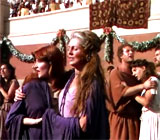
Unafraid, Christians Sang Before Their Deaths
|
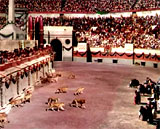
Lions Released Within Arena
|
- during the mutilations, Poppaea suggested that Nero
detain Marcus and Lygia for a "surprise" she had planned for their
fate; later that evening, Nero was amazed that many of the bloodied
corpses in the arena had smiles on their faces; in their cell,
Lygia confessed her love for Marcus (who felt that he had become
a Christian), and asked for Peter to officiate a marriage ceremony
between them ("Before I die, I want to marry Marcus"); afterwards,
for preaching rebellion and blasphemy, Peter was taken and ordered
to be crucified upside-down on Vatican Hill
- back in the arena, while also being mercilessly
crucified (and burned to death), retired General Plautius accused
Nero of being monstrous: "Rome is ruled by a monster who tells
you the Christians burned Rome. But he lies. You lie, Nero. You
are the incendiary"; the next day in the arena, Marcus was taken
to Nero's viewing platform to watch Lygia tied to a stake as she
was attacked by a bull (Poppaea's 'surprise' for Nero);
after Ursus protected her by breaking the bull's neck, Marcus freed
himself, and jumped into the arena to embrace Lygia; he confronted
Nero, and although Nero ruled 'thumbs down,' Marcus was saved by
'thumbs up' from all of Nero's other advisors and rescued by his
loyal soldiers; Marcus addressed the spectators, condemned Nero
for his brutalities, and announced that General Galba
was marching toward Rome to replace him and "rebuild Rome and bring
back justice"

|
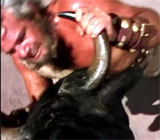
|

|
|
In the Arena, Lygia Was Defended Against
a Bull by Ursus
|
- in the film's conclusion, Nero's bloody tyrannical
reign came to an end; in his palace where he had fled from the
angry mob, Nero was informed by Poppaea that all of his Praetorian
guards were either dead or in revolt; angered and blaming
her (his "evil genius") for making martyrs of the Christians
that led the people to rebel and cause his downfall ("It was
you who turned my people, my faithful subjects against me"),
Nero strangled her to death, and then as the mobs surrounded the
cowardly Nero in his locked throne-room, he was assisted in stabbing
himself to death with a dagger offered by his embittered, banished
slave Acte (Rosalie Crutchley) ("You've lived like a monster.
Now die like an emperor - by your own hand")

Poppaea Strangled to Death by Nero
|

|

|
|
Nero Helped by Acte to Stab Himself to Death
|
- in the final scene, orphaned boy Nazarius showed
Marcus and Lygia the "blessed spot" where the Lord had spoken to
Peter on the road leading out of Rome
|

Emblems of Roman Power Atop Standards

Marcus Vinicius (Robert Taylor)

Emperor Nero (Peter Ustinov)

Marcus with His Uncle Gaius Petronius (Leo Genn) - One of Nero's Most Trusted
Advisors
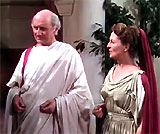
Retired Gen. Plautius and His Wife Pomponia

Family Friend and Rabbi Paul of Tarsus (Abraham Sofaer)


Nero's Consort Empress Poppaea
(Patricia Laffan)

Spanish Slave Eunice (Marina Berti) Refused by Marcus - and Later
Becoming Petronius' Infatuated Lover

Marcus with Reluctant Hostage Lygia - Nero's Reward to Him

Simon Peter (Finlay Currie) Speaking to Christians During Nighttime Secret Ceremony
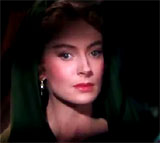
Lygia Listening to Peter's Sermon

Lygia Caring for Marcus' Head Wound

Lygia and Marcus Kissing and Showing Their Love For Each Other

After Breaking Up with Lygia, Marcus Was Kissed by Poppaea

Marcus Saving Lygia During the Fire

Nero Playing His Lyre While Rome Burned

Poppaea (with General Tigellinus) Proposing to Blame the Christians for the Destructive
Fire

Peter's Vision of God's Light When Leaving Rome


With a Liberated and Freed Eunice, Petronius Committed Suicide - And She Joined
Him

In Arena Cell: Lygia to Marcus: "I want to be your wife now"


General Plautius: "You lie, Nero!"


Marcus in Arena With Lygia - Saved
|



























